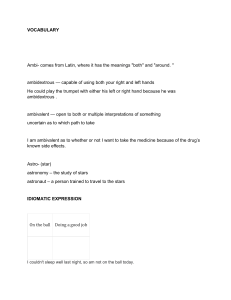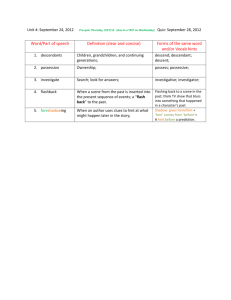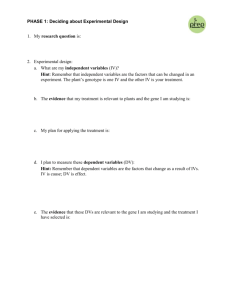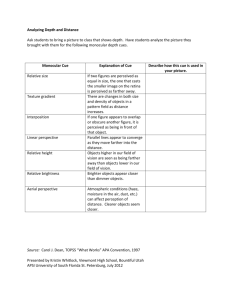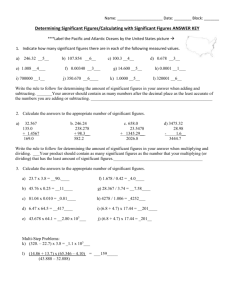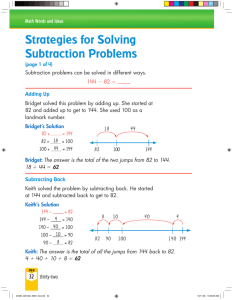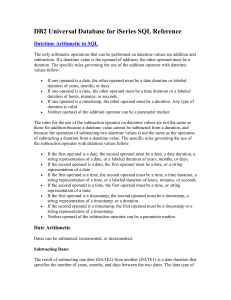Chapter 2 Section 3 Lesson Adding and Subtracting Signed
advertisement
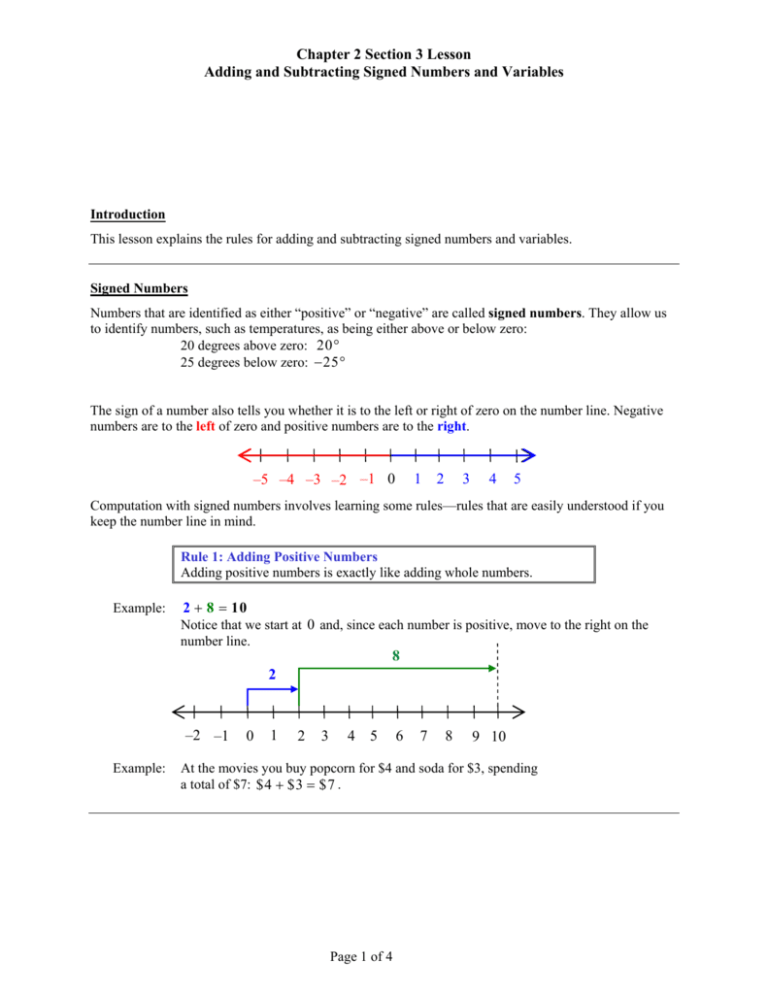
Chapter 2 Section 3 Lesson Adding and Subtracting Signed Numbers and Variables Introduction This lesson explains the rules for adding and subtracting signed numbers and variables. Signed Numbers Numbers that are identified as either “positive” or “negative” are called signed numbers. They allow us to identify numbers, such as temperatures, as being either above or below zero: 20 degrees above zero: 20° 25 degrees below zero: − 25 ° The sign of a number also tells you whether it is to the left or right of zero on the number line. Negative numbers are to the left of zero and positive numbers are to the right. –5 –4 –3 –2 –1 0 1 2 3 4 5 Computation with signed numbers involves learning some rules—rules that are easily understood if you keep the number line in mind. Rule 1: Adding Positive Numbers Adding positive numbers is exactly like adding whole numbers. Example: 2 + 8 = 10 Notice that we start at 0 and, since each number is positive, move to the right on the number line. 8 2 –2 –1 Example: 0 1 2 3 4 5 6 7 8 9 10 At the movies you buy popcorn for $4 and soda for $3, spending a total of $7: $4 + $3 = $7 . Page 1 of 4 Rule 2: Adding Negative Numbers When adding negative numbers, the sum is always a negative number. Example: ( − 4 ) + ( − 3) = − 7 Notice that we start at 0 and, since each number is negative, move to the left on the number line. −3 −4 –8 –7 –6 –5 –4 –3 –2 –1 Example: 0 1 On a quiz, your friend missed 5 points on Question 1 and 15 points on Question 2. Missing 5 points can be written as − 5 , and missing 15 as − 15 . In all, your friend missed 20 points: ( − 5) + ( − 1 5) = − 20 . Rule 3: Adding Positive and Negative Numbers Adding positive and negative numbers is a little trickier. Ignoring the signs, first find the difference between the larger number and the smaller number. Then, give your sum the sign of the number farther from zero. Example: 3 + ( −9) = ? The difference between 9 and 3 is 6 . Since − 9 is farther from 0 than 3 , the sum is negative: 3 + ( − 9 ) = − 6 . Notice that we start at 0 and move to the right on the number line for 3 , which is positive, and then to the left for − 9 , which is negative. −9 3 –6 –5 –4 –3 –2 –1 Page 2 of 4 0 1 2 3 Extended Example 1 − 81 + 19 = ? Hint: To add positive and negative numbers, first find the difference between the larger number and the smaller number. Step 1: 81 − 19 = 62 Hint: Then give the sum the sign of the number farther from zero. Answer: − 81 + 19 = − 62 Since − 81 is farther from zero than 19 , the answer is negative. Rule 4: Adding Opposites When you add positive and negative numbers (or variables) that are the same distance from zero, the sum is 0 . Another way to state this rule is “The sum of a number and its opposite is zero.” ( −a ) + a = 0 Example: ( − 3) + 3 = 0 3 −3 –6 –5 –4 –3 –2 –1 0 1 2 3 Rule 5: Subtracting Signed Numbers To subtract a number, add the number being subtracted but use its opposite sign. In other words, change the sign of the subtracted number and change the problem to an addition problem. You can think of “subtracting” as “adding the opposite” to help you remember this rule. a − b = a + ( −b ) Example: 8 − 3 becomes 8 + ( − 3) = 5 −3 8 –2 –1 0 1 2 3 4 5 6 7 8 9 10 continued… Page 3 of 4 continued… Examples: 9 − ( − 2 ) becomes 9 + 2 = 1 1 a − ( −b ) = a + b − 4 − 5 becomes − 4 + ( − 5) = − 9 − a − b = − a + ( −b ) − 7 − ( − 5) becomes − 7 + 5 = − 2 − a − ( −b ) = − a + b Example: It’s 70° in Texas and − 10° in Alaska. What's the difference in temperature? 70 − ( − 10 ) = 70 + 10 = 80 . The difference is 80° . Extended Example 2 − 8 − ( − 5) = ? Hint: Change the sign of the subtracted number and change the problem to an addition problem (add the opposite). Step 1: −8 + 5 Hint: First find the difference between the larger and smaller numbers, then give the sum the sign of the number farthest from zero. Answer: The difference between 8 and 5 is 3 , and since − 8 is farther from zero than 5 , the answer is negative: −8 + 5 = −3 . End of Lesson Page 4 of 4

